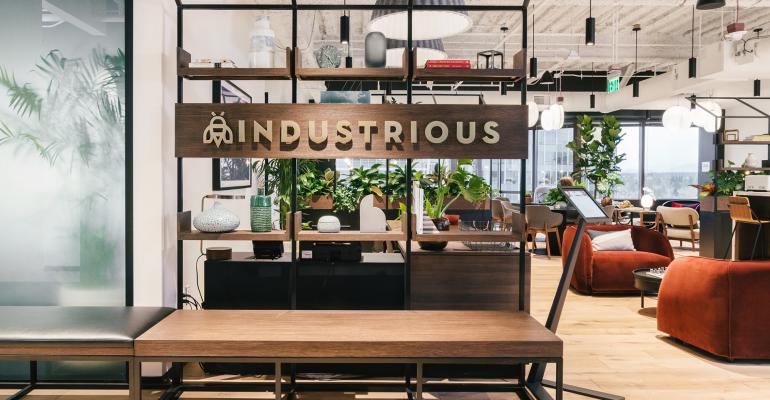Commercial real estate services firm CBRE has just invested $200 million to acquire a 35 percent share of flexible workspace operator Industrious, with plans to purchase another 5 percent in the near future, making CBRE Industrious’ largest shareholder.
According to Bloomberg, Industrious, which now has more than 100 locations in 50 U.S. cities, plus Singapore, is already backed by approximately $200 million from other investors, including Brookfield Properties.
As part of the deal, CBRE is merging its own flexible workspace operation, CBRE Hana, with Industrious. When the transaction closes, 10 CBRE U.S. and U.K. Hana locations will be operated by Industrious.
“CBRE’s significant investment in Industrious underscores its commitment to flex (office solutions),” says Hana CEO Andrew Kupiec, noting that recent CBRE surveys revealed that 86 percent of the firm’s occupier clients, including some of the world’s largest global corporations, plan to incorporate flexible space into their real estate strategies. Kupiec has been charged with overseeing CBRE’s relationship with Industrious.
“This investment further enables CBRE to meet the growing demand for flexible space solutions from both owner and occupier clients,” he says. “We recognize the flex space industry is undergoing consolidation, and this provides the scale to meet growing client demand,” he adds.
The acquisition is consistent with CBRE’s view that flexible office space is playing an increasingly central role in many companies’ occupancy strategies, noted a press release from Bob Sulentic, CBRE president/CEO, who along with Emma Giamartino, CBRE global chief investment officer, is joining Industrious’ board of directors.
CBRE originally launched Hana to meet growing demand from owner and occupier clients for flexible space solutions, but the partnership with Industrious “enables us to capitalize on this opportunity at scale with a portfolio of well-situated locations in key markets.”
In an important differentiation for a world that’s slowly coming out of a pandemic, rather than focusing on traditional open-plan, co-working spaces, Industrious offers tenants private offices and suites on flexible terms.
Industrious was also among the first sector operators to move to a management agreement platform, where landlords receive a share of its profits, rather than a long-term lease commitment. As a result, Hodari told Bloomberg that the decision to move to a management agreement model made his firm a more sustainable, stable business in a time of macroeconomic turmoil.
Many co-working operators have moved to or are in the process of moving to a similar model, according to Mark Gilbreath, founder and CEO of LiquidSpace. Noting that the hospitality industry is built on a similar business model, where hotel brands manage operations but don’t own the real estate, he suggests that this is a sign that the co-working industry is maturing, as a model built on long-term lease commitments is inefficient and puts both operators and landlords at risk.
Gilbreath agrees that the pandemic has accelerated rising demand for flexible office space and contends that large employers want to shift to more flexible, agile work options and are trending toward a more distributed workforce. As a result, he forecasts that many large companies might downsize their traditional leased footprints and make employees work from their homes and flexible workspaces, such as co-working and satellite offices near where employees live.
“Businesses will continue to have a need for flexible office space as they recalibrate occupancy strategies in the near-term,” adds Ben Munn, global head of flex space at real estate services firm JLL. “From a longer term standpoint, trend lines show an increasing demand for flexible space as the hybrid work approach gains momentum.”
Noting that employees will be seeking more flexibility in where, when and how they work, he adds, “As we enter a more worker-centric era, companies will be looking to ensure they are providing choice and flexibility to their employees.”
As a result, landlords might need to provide a variety of flexible office products in their assets to support the shape of that occupier demand,” Munn says, stressing that this will manifest differently than prior to the pandemic. “We see a move from third-party-operator, lease-arbitrage models to landlords taking an active asset and experience management approach to their buildings,” he says, noting that JLL is positioning itself to serve that need.
Many co-working operators are currently seeking both operational and capital partners, according to Gilbreath, but he notes that the most natural partnership opportunities are with landlords/building owners. Capital investors, on the other hand, should be looking for flex office opportunities, but not necessarily just co-working operators.
Pre-COVID-19, JLL predicted that flexible office space would comprise 30 percent of the enterprise workplace footprint by 2030, according to Gilbreath. “Smart money around the table now expects this to happen significantly sooner—possibly by 2025 or sooner.”





